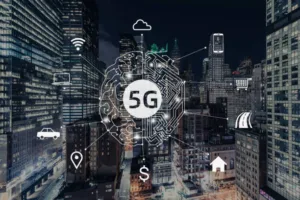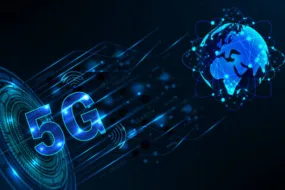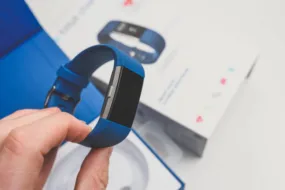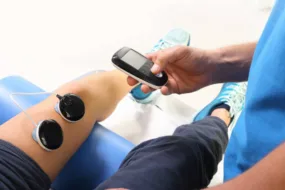Self-driving cars and remote surgeries:

Imagine a world where cars drive themselves and surgeons operate from miles away. The future depicted here is not fiction; it depicts the exciting possibilities that 5G technology makes possible. 5G offers a significant leap forward from previous cellular networks, promising blazing-fast speeds, ultra-low latency (response time), and massive network capacity. These advancements are fundamentally changing how we interact with the world, including the way we travel and receive medical care.
What is the impact of 5G on self-driving cars and remote surgeries?
Self-driving cars, also known as autonomous vehicles (AVs), hold immense potential to transform our roads. Imagine traffic jams becoming a thing of the past, with cars seamlessly communicating with each other and their surroundings to navigate efficiently. But for AVs to become a reality, they need a reliable and high-speed network to function flawlessly. Here’s where 5G comes in:
i. Real-time Decision Making: AVs rely on a constant stream of data from sensors like cameras, radar, and LiDAR to perceive their environment. 5G’s ultra-low latency ensures this data is transmitted and processed instantaneously, allowing AVs to make real-time decisions for safe navigation.
ii. High-Definition (HD) Mapping: Detailed, up-to-date maps are crucial for AVs to understand their surroundings. 5G’s high bandwidth enables the transmission of large amounts of map data, including real-time updates on traffic conditions, road closures, and even weather changes.
iii. Vehicle-to-Everything (V2X) Communication: V2X allows AVs to communicate with other vehicles, pedestrians, and infrastructure, creating a collaborative traffic ecosystem. 5G facilitates this communication with its high capacity and reliability, ensuring smoother traffic flow and reducing accidents.
Read More: How 5G Powers the Future of Urban Living
The Benefits of 5G-Powered Self-Driving Cars:
These benefits are numerous, including:
i. Improved Safety: Studies suggest AVs can significantly reduce traffic accidents caused by human error.
ii. Reduced Traffic Congestion: Efficient communication between AVs can optimise traffic flow, leading to less congestion and shorter commute times.
iii. Increased Accessibility: Self-driving cars can provide mobility solutions for people who cannot drive themselves due to age, disability, or other factors.
Challenges and Considerations for 5G-Powered Self-Driving Cars:
i. Regulation and Legal Frameworks: As a new technology, self-driving cars require clear regulations and legal frameworks to address liability and safety concerns.
ii. Cybersecurity Threats: Because of the reliance on software and technology, robust cybersecurity measures are required to protect self-driving cars from hacking attempts.
iii. Public Perception and Acceptance: Gaining public trust and acceptance for self-driving cars is crucial for their widespread adoption.
Read More: Unveiling the Next Gen of Wearable Health Trackers
5G for Remote Surgery: Bringing Healthcare to New Places

Imagine a surgeon performing a life-saving operation on a patient located hundreds of kilometres away. This futuristic concept, called remote surgery, is becoming a reality with the help of 5G. Here’s how:
i. Ultra-Precise Control: Remote surgery relies on real-time video and haptic feedback to allow the surgeon to precisely control surgical instruments. 5G’s minimal latency ensures minimal lag between the surgeon’s actions and the instruments’ responses, enabling smooth and accurate control.
ii. High-Resolution Imaging: To make critical decisions, remote surgeons need high-resolution images of the surgical site. 5G’s high bandwidth allows for the transmission of crystal-clear video feeds, providing the surgeon with a detailed view of the operation.
iii. Reliable Connectivity: Even a minor network interruption during a remote surgery can have critical consequences. 5G’s ultra-reliable connection ensures a constant and stable data flow throughout the procedure.
Benefits of 5G-Powered Remote Surgery
The potential benefits of 5G-powered remote surgery are significant:
i. Better Access to Specialists: Patients in remote areas have access to specialised surgical care that may not be available locally.
ii. Enhanced Surgical Precision: 5G’s capabilities can potentially lead to even more precise surgical procedures and improved patient outcomes.
iii. Reduced Healthcare Costs: Remote surgery eliminates the need to transport patients for specialised care, potentially leading to cost savings.
Read More: 5 Ways 5G Technology is Revolutionising the IoT
Challenges and Considerations For 5G-Powered Remote Surgery
i. Technical Infrastructure: Implementing remote surgery requires significant investment in 5G infrastructure and specialised surgical equipment.
ii. Surgeon Training and Skills: To adapt to the unique demands of working with a time delay, remote surgeons require specialised training.
iii. Ethical Considerations: Remote surgery raises ethical considerations regarding patient consent, data privacy, and potential technical malfunctions.
The Future is Connected: 5G Leading the Way

5G is a game-changer, paving the way for a future filled with self-driving cars and advanced telemedicine. While challenges remain, the potential benefits are undeniable. As 5G technology continues to evolve and become more widely available, we can expect to see these innovations revolutionise transportation and healthcare, making our lives safer, healthier, and more connected.
Read More: Exploring the Smart Life-Compatible Switches and Plugs
Conclusion:
The transformative power of 5G is paving the way for a revolution in transportation and healthcare. Self-driving cars are set to make roads safer and more accessible, while remote surgery promises to deliver improved care to people everywhere. With continued collaboration and development, these advancements have the potential to create a world where driving is a choice, not a necessity, and where location is no longer a barrier to receiving specialised medical attention.
5G is the key that unlocks this exciting future, and as this technology matures and reaches more corners of the globe, we can look forward to a more connected and seamless experience in all aspects of our lives. So, buckle up (or don’t!) because the future of mobility and healthcare is arriving faster than ever before.










